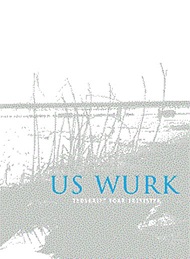Fuortsettende mulwurden as yntinsivearjende bywurden yn it Frysk
Abstract
This article deals with present participles in Frisian such as glûpende,opfallend(e) or skitende, used as adverbs of degree with a strongly
intensifying meaning. Most of these adverbs can be reduced to an original
literal meaning, which may be summarized as: something is so intensive
that it leads to a physical action or produces a physical or mental effect.
The nature of this action or effect is strong or unfavourable. In fact, many of
these adverbs are linked to words with a negative emotional value, but there
are also looser combinations, in which the original meaning of the verb
does not play a role anymore. In the latter case, the adverbs are merely
intensifiers; they have been completely grammaticalized.
The question arises as to whether using present participles as
intensifying adverbs is a typically Frisian phenomenon. The answer must be
negative, because such adverbs appear in other languages too. Nevertheless,
in Frisian the number of these adverbs is relatively high in
comparison with Standard Dutch. This may be explained by the Frisian
emphatic -e. This -e, added to intensifying adverbs, links up perfectly with
the final -e of the participial ending -ende. Furthermore, we can see that
Frisian prefers intensifying adverbs that are reducible to an original literal
meaning in which an unfavourable physical aspect plays a role. Possibly
this is due to the fact that the effects of standardization and civilization have
had less of an impact on Frisian than on Dutch.

